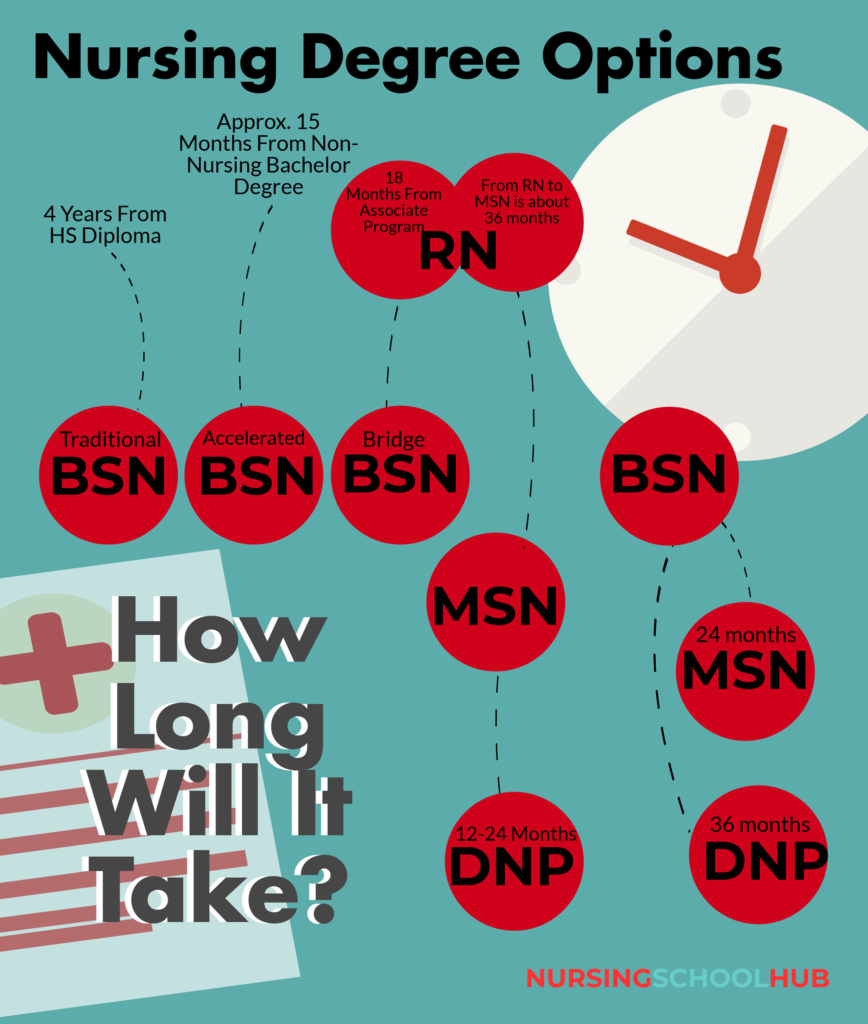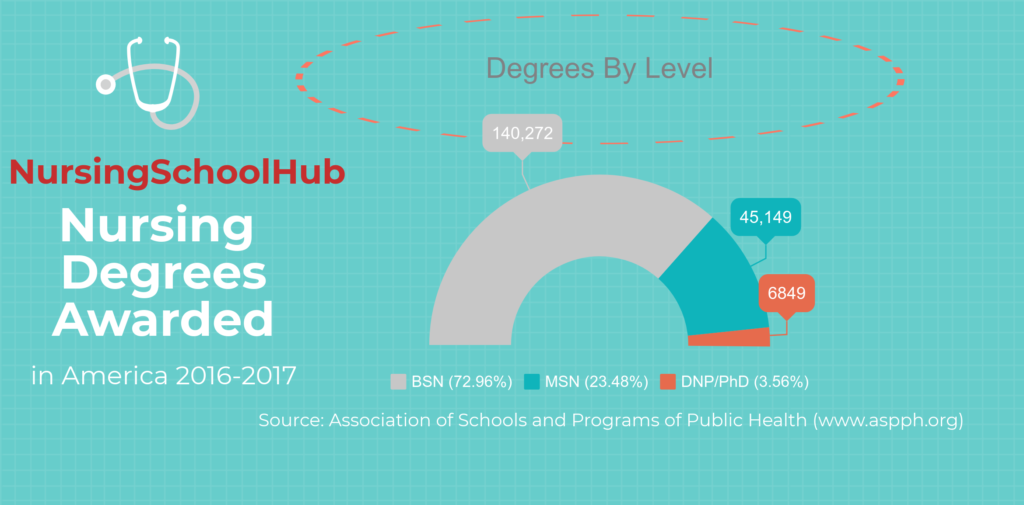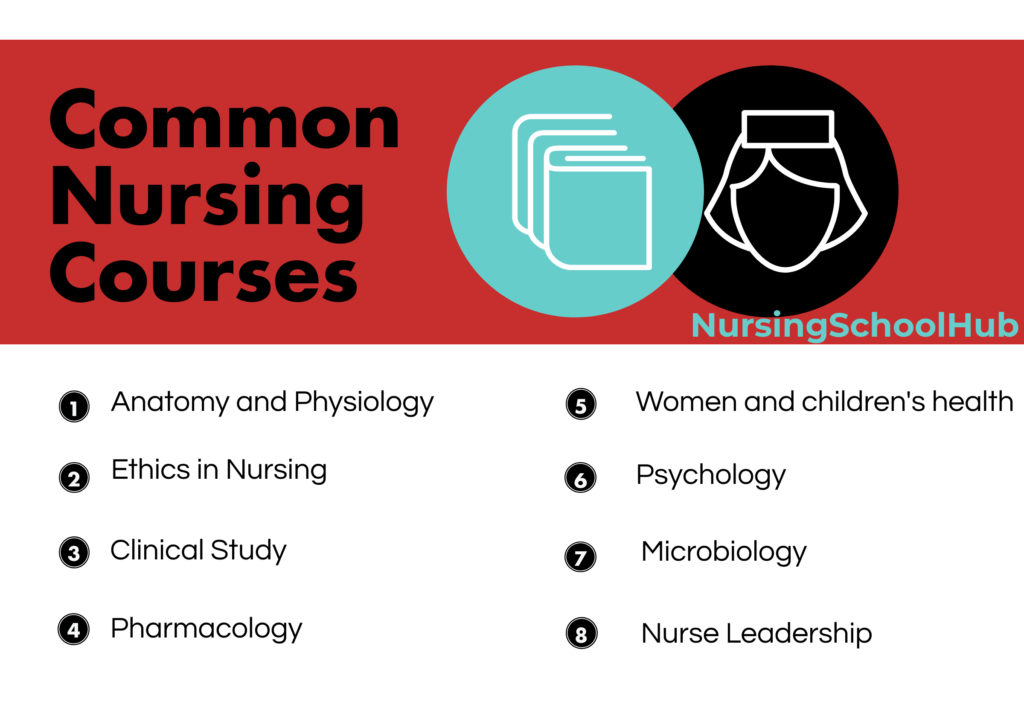Nursing Rankings from Nursing School Hub provides lists of the best programs to start or expand your career in nursing. Those looking to go into the nursing field will discover that there are multiple educational options. These options start with an associate degree in nursing and go up to the doctoral level.
While most nurses begin their career with a diploma or certificate (which is enough to become an LPN) or an associate’s degree (which is enough to become an RN), that is not the end of the road. Many will go on to get their BSN for higher pay; their MSN for a specialization; or even a Doctor of Nursing Practice or PhD for advanced practice and leadership.
Kinds of Nursing Degrees
Featured Programs
The most common program for prospective nurses is a bachelor of science in nursing schools. However, many nurses also pursue a master of science in nursing programs across the country. This is because the benefits of a master’s degree in nursing include higher pay, better advancement opportunities, and more employment prospects than a bachelor of nursing.
Doctoral nursing programs are even better for employment prospects, but many students don’t want to deal with the added expense and time that comes with completing a doctoral program. That’s okay, as most nurses have simply completed a bachelor of science in nursing schools.

Associate Degree In Nursing
The most basic degree that a student can complete to go into the nursing field is an associate’s degree. This qualifies the student to work as a nurse’s assistant or as an RN, although many healthcare employers want their RNs to have completed a bachelor’s degree.
However, the majority of students who complete an associate’s degree in nursing go on to earn at least a bachelor’s degree. It’s common for students to complete an associate’s degree, and then go on to complete one of the many bachelors of nursing schools at night while working as a nurse’s assistant or RN during the day.
Bachelor’s Degree In Nursing
The majority of working nurses have a bachelor’s degree. A bachelor’s degree in nursing is known as a BSN, which stands for Bachelor of Science in Nursing. As previously mentioned, the minimum requirement for an RN position is an associate’s degree. Having a BSN, however, will certainly help applicants for nursing jobs stand out in this competitive field.
A BSN will usually consist of the same curriculum found in the associate’s program, with additional requirements for practical experience, scientific courses, and often leadership and management-related courses. Leadership and management courses are common in BSN programs because nurses at this level often manage nurse’s assistants and other RNs.
Consider Masters Of Science In Nursing Programs
The benefits of a master’s degree in nursing are not as well-known as the benefits of getting a bachelor’s degree in nursing. A master’s degree in nursing qualifies nurses as APNs. APN stands for advanced practitioner nurse. APNs specialize in a variety of areas. The nurses that work with an anesthesiologist are APNs.
Also, nurse midwives, who assist in the labor and delivery of babies, are APNs. Finally, nurse practitioners, who can prescribe medications under the supervision of a doctor, are APNs with a master’s degree or higher.
Doctoral Nursing Programs
There are two main types of doctoral nursing programs. The most common is the DNP. DNP stands for Doctor of Nursing Practice. A DNP degree is the highest level of clinical education available to nurses. There are also Ph.D. programs in nursing.
Many students who receive this degree become professors of nursing or researchers. It is also common for those who hold a Ph.D. in nursing to work in management positions at large hospitals.
Top 10 Best Traditional Nursing Schools
10 LPN/LVN to RN Degree Programs
Most Affordable Traditional Nursing Degree Programs
LPN to RN Programs
Top LVN Programs
RN to BSN Programs
Top RN to MSN Programs
How to Pick A Nursing Concentration
There are many nursing fields for students to choose from. These nursing majors include gerontology, neonatal nursing, ontological nursing, and dermatological nursing. Students may have a hard time choosing which of the many nursing fields they want to specialize in.
Certain concentrations may pay more on average than others, and this certainly factors into the decision for many students. However, experienced nurses often recommend that students choose a specialty they are genuinely interested in, as this will lead to a higher degree of job satisfaction in the long run.
Gerontology
Gerontology is a medical specialty that involves working with elderly people. More nursing majors are choosing to go into this specialty, as this field is experiencing rapid growth due to the aging population of the United States. Common medical concerns that gerontological nurses treat include arthritis, heart disease, Alzheimer’s Disease, and more.
Neonatal Nursing
Neonatal nursing involves caring for newborn babies. Many nurses work in neonatal intensive care units, where babies who have serious birth defects receive vital care until they are healthier. While this is the best-known area of practice for neonatal nurses, nurses in this specialty also take of healthy babies. Even healthy babies need specialized care, and this is where neonatal nurses come in.
While certain neonatal nursing positions only require a bachelor’s degree, many positions in this specialization actually require a master’s degree. Students looking into the different Master in Nursing specialties will likely be able to find multiple options for post-graduate degrees in neonatal care.
Oncological Nursing
Oncological nursing involves treating patients with cancer. Unfortunately, the rate of cancer is rising in the United States, leading to an increase in oncological nursing positions. These positions are also quite highly paid. Many oncological nurses have post-graduate educations, with a master’s degree being quite common. However, students do not necessarily need to pursue a master’s degree if they want to become oncological nurses.
Some nurses in this field learn by obtaining a great deal of practical experience treating cancer patients while under the supervision of highly qualified nurses. Oncological Nursing is one of the most popular nursing majors, and it will likely continue to be popular given the growth of patients.
Dermatological Nursing
Getting into the field of dermatological nursing is quite competitive. Even students who are looking into master’s in nursing specialties often have a hard time getting into a program with a dermatological concentration. Dermatological nurses are well-paid and usually don’t have to treat patients with life-threatening illnesses.
The same is true for doctors who are considering entering the field of dermatology, and they are often among the brightest students in their respective classes. The same is true for dermatological nurses. As more students enter the nursing profession, the level of competition will only increase.
Top 10 Nurse Anesthetist Programs
10 Nursing/Health Informatics Degree Programs
Online Schools for Gerontology Nursing Degree Programs
Top 15 Forensic Nursing Programs
30 Best Nursing Schools for Research
Should I Choose an Online Or On-Campus Nursing Program?
Many students who are looking into the nursing field are interested in online programs. Just a few years ago, online nursing degree programs were few and far between. These days, there a quite a few online nursing programs. Students who are interested in studying nursing over the Internet naturally want to learn about what the best online nursing programs have to offer. For an overview of studying nursing online, read on.
Nursing Degrees by Level

Online Associate Nursing Programs
The most common type of online nursing degree that students going into this field obtain is an associate’s degree. Nearly all the best online nursing programs will offer an associate’s program. There are quite a few online associate nursing programs, so choosing the right one can be a little tricky. There are a few things that students who want to get an online nursing degree for non-nurses can do to ensure they enroll in the right program.
First of all, ensure that the program you’re applying to is fully accredited. The school must be regionally accredited. The program itself must also be recognized by either CCNE or ACEN. These are the two respected nursing accreditation bodies in the United States. Many online associate nursing programs are not accredited, so prospective nursing students should be careful when applying to programs that offer an online nursing degree for non-nurses.
Free Online Nursing Courses With Certificate
There are quite a few online nursing courses with certificates. While these programs won’t qualify students to become RNs, a certificate can be useful. For example, applicants for nursing assistant positions can stand out from the crowd with a certificate. Also, applicants to online BSN programs for non-nurses may be able to distinguish themselves from other students by completing a course and receiving a certificate. If you’re asking ‘Are there any online nursing programs near me?’ you are more likely to find a certificate program than online BSN nursing programs.
Online BSN Nursing Programs
There are many reputable online BSN programs for non-nurses. Even if students don’t already have an associate’s degree in nursing, they can likely find multiple answers to the question “Are there any online nursing programs near me?” These BSN programs will likely require their students to complete a great deal of practical experience before they receive their degrees. Many online BSN nursing programs partner with local hospitals to ensure that their students can complete internships and get the experience they need to prepare for a successful career in nursing.
Online LPN Nursing Programs
There aren’t quite as many online LPN nursing programs, as access to on-campus mentorship is important for students who are entering this advanced area of nursing. Also, an LPN degree requires even more practical experience, and it can be difficult to get the required internships if the students are studying online. There are many LPN programs that offer a hybrid model. This means that these programs offer some of their classes online, while other classes must be taken on-campus.
Accelerated, Executive, and Other Non-Traditional Formats
There are many accelerated nursing programs that are designed for people who are working in the field of nursing. Many of these accelerated nursing programs allow their students to complete a degree in 24 months or even as few as 12 months. This allows students who complete these programs to advance more quickly in their careers.
Of course, these accelerated programs require a heavy course load. This can be especially difficult for students who are already working in the field. Accelerated nursing programs may not be the right choice for every student. Only the most driven and hardest working students are likely to succeed in a non-traditional program.
Completing Accelerated Nursing Programs Online
Completing accelerated nursing programs online may be the only option for many working professionals. An online program offers a greater degree of flexibility than an on-campus program. Many in the nursing profession work long hours, so the ability to complete their schoolwork from their own homes is vital. However, it can be tough to find an online accelerated nursing program.
As with other nursing programs, most schools offer accelerated nursing programs on-campus. While it can be tricky to find a fully online accelerated nursing program, many schools do offer a hybrid model. This involves taking classes both online and on-campus for a balance of in-person mentorship and flexibility.
Executive Nursing Programs
Students researching online accelerated nursing degrees will find executive nursing programs. There are many online executive nursing programs, as this specialization focuses more on management than on treating patients. This means that clinical experience is not as much of a priority. Most executive nursing positions require a great deal of practical experience as well as an executive nursing degree.
By the time that nurses apply to executive nursing programs, they already have the practical experience that is important in other types of nursing degrees. This makes executive nursing education ideal for online students, as the practical experience is exactly what cannot be completed online. Even if the executive nursing degree they are studying for does require practical experience, students may be able to get this practical experience in the job they already have.
Most executive nursing students are currently working in the nursing field, so this would be convenient for them. Also, getting an online executive nursing degree is highly desirable as working students need the flexibility offered by taking classes over the Internet.
Hybrid Programs
Another non-traditional format for nursing programs is the hybrid format. As previously mentioned, these programs allow some classes to be taken online, while others must be completed on-campus. While online nursing programs are still relatively rare as compared to on-campus programs, hybrid nursing degrees are becoming more and more popular.
Even schools that do not offer fully online nursing degrees often offer some of their classes online. As with other non-traditional modes of nursing education, that makes these programs are perfect for working students. Whether students are already working in the nursing field or not, a hybrid nursing program may be the right choice.
Top 10 Best Online Nursing Degree Programs
10 Best Online Nursing Programs
Online Nursing Degree Programs
25 Most Affordable Online Nursing Degree Programs
Top 25 Online RN to BSN Programs
Online Doctor of Nursing Practice (DNP) Programs
Top Online MSN Programs
Online RN to BSN Programs
What Will I Learn in a Nursing Degree Program?
All nursing degree programs are different. However, most programs have similar course requirements. Nursing degrees have three different components. First, students will start off doing the foundation courses. These classes are also known as nursing prerequisites classes. Nursing prerequisites classes usually include biology, chemistry, anatomy, and similar courses.
Next, students have to complete advanced classes and clinical experience internships. These are usually completed at the same time. Advanced classes often reflect the student’s chosen specialization. Oftentimes, students will start with general clinical experience and move on to clinical experience in their chosen specialty.
Common Nursing Courses

Common Foundation Courses
Most schools require that all of their students, including nursing students, complete basic composition, math, and humanities courses. After finishing these classes, nursing students will move on to more advanced biology and chemistry courses. These classes are usually required for biological sciences majors including nursing.
Common Advanced Courses
This is where nursing students start actually taking classes in nursing. As they progress in their degree program, students will often take classes that focus on their area of concentration. Many schools have blended advanced courses and clinical experience for a holistic approach to learning.
Advanced courses are less likely to be available on the online nursing courses list than the more basic courses, as many advanced courses require a hands-on approach that is not compatible with online learning. Still, some nursing programs will offer these more advanced courses on their nursing courses list.
Clinical and Practical Experience
Many nursing professionals consider the clinical experience portion of a nursing degree to be the most important of the nursing degree requirements. In fact, employers interviewing nursing graduates often value practical experience as much or more than the GPA. Students apply coursework knowledge to actual patients, which can be challenging but is absolutely necessary. There is a good reason that all accredited nursing programs have extensive clinical experience requirements.
Nursing Degree Requirements
When a nursing student applies to graduate, the staff and faculty of their program will evaluate their progress over the three areas that comprise the degree. Of course, the student must have already completed the basic courses with satisfactory grades to advance to this point. This means that the basic courses will be taken into account only to ensure that the student has met GPA and total credit requirements.
As long as the student meets all the school’s nursing degree requirements, they can earn their degree. However, they still must pass the licensure exam before they can actually start working as an RN, LPN, or any other type of nurse. The requirements to get a nursing degree and obtain a license are quite stringent to ensure that only worthy students can enter the profession. Prospective nursing students should take this into account when they consider entering a nursing program.